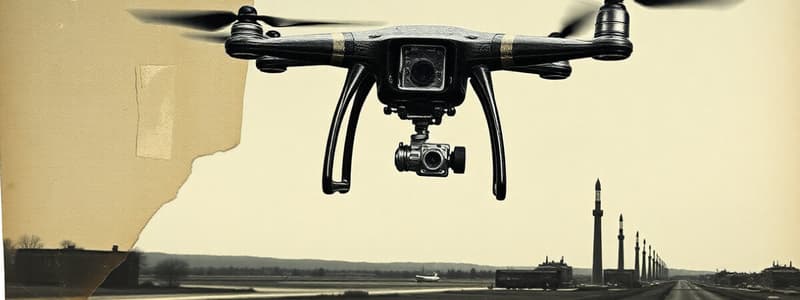Podcast
Questions and Answers
What is the maximum weight for drones that fall under CFR 107 regulations?
What is the maximum weight for drones that fall under CFR 107 regulations?
- 55 pounds (correct)
- 25 pounds
- 100 pounds
- 75 pounds
Which is a requirement for night operations of drones?
Which is a requirement for night operations of drones?
- Flying above 400 feet
- Use of additional lighting (correct)
- Advanced operator certification
- Flight over moving vehicles
What must operators of drones do every two years to maintain their Remote Pilot Certificate?
What must operators of drones do every two years to maintain their Remote Pilot Certificate?
- Pass a knowledge test or training (correct)
- Retake the Aeronautical Knowledge Test
- Complete a refresher course
- Attend an FAA conference
What should be reported immediately by drone operators?
What should be reported immediately by drone operators?
What is a restriction regarding operations near airports?
What is a restriction regarding operations near airports?
Flashcards are hidden until you start studying
Study Notes
CFR 107: Key Points
Drone Regulations
- Governs the operation of small unmanned aircraft systems (sUAS).
- Applies to drones weighing less than 55 pounds.
- Establishes rules for commercial and educational use of drones.
- Requires compliance with specific operational limits.
Safety Protocols
- Drones must be flown below 400 feet.
- Visual line-of-sight (VLOS) operation is mandatory.
- Night operations require additional lighting.
- Pre-flight inspections are required to ensure safety.
- No operations over people or moving vehicles unless specific conditions are met.
Operator Certification
- Remote Pilot Certificate required for commercial drone operation.
- Must pass the FAA's Aeronautical Knowledge Test.
- Requires a background check by the TSA.
- Certificates must be renewed every two years through a knowledge test or training.
Reporting Requirements
- Immediate reporting of accidents involving serious injury or property damage over $500.
- Must report any lost or stolen drones.
- Operators must maintain records of drone operations, including maintenance and pilot logs.
Airspace Restrictions
- Prohibitions in controlled airspace (Class B, C, D).
- Must obtain authorization for flights in restricted areas.
- Temporary Flight Restrictions (TFRs) may be enacted for special events.
- Operational limitations near airports; must stay at least 5 miles away unless authorized.
Drone Regulations
- Covers small unmanned aircraft systems (sUAS), specifically drones under 55 pounds.
- Establishes rules tailored for commercial and educational usage.
- Enforces compliance with designated operational restrictions.
Safety Protocols
- Flight altitude is capped at 400 feet to minimize risk.
- Visual line-of-sight (VLOS) flying is essential to maintain control.
- Night operations necessitate additional lighting for safety.
- Pre-flight inspections are mandatory to ensure drone readiness.
- Flight is prohibited over people or moving vehicles unless certain conditions are satisfied.
Operator Certification
- A Remote Pilot Certificate is mandatory for commercial drone pilots.
- Pilots must successfully complete the FAA's Aeronautical Knowledge Test.
- A background investigation by the TSA is required for certification.
- Certificates require renewal every two years, either via a knowledge test or training program.
Reporting Requirements
- Accidents resulting in serious injury or over $500 in property damage must be reported immediately.
- Operators are obligated to report lost or stolen drones.
- Maintenance logs and pilot records must be consistently maintained.
Airspace Restrictions
- Operations are limited in controlled airspace classifications (Class B, C, D).
- Authorization is necessary for flights in restricted airspaces.
- Temporary Flight Restrictions (TFRs) can be invoked for specific events.
- Drones must stay at least 5 miles away from airports unless authorized to operate closer.
Studying That Suits You
Use AI to generate personalized quizzes and flashcards to suit your learning preferences.




